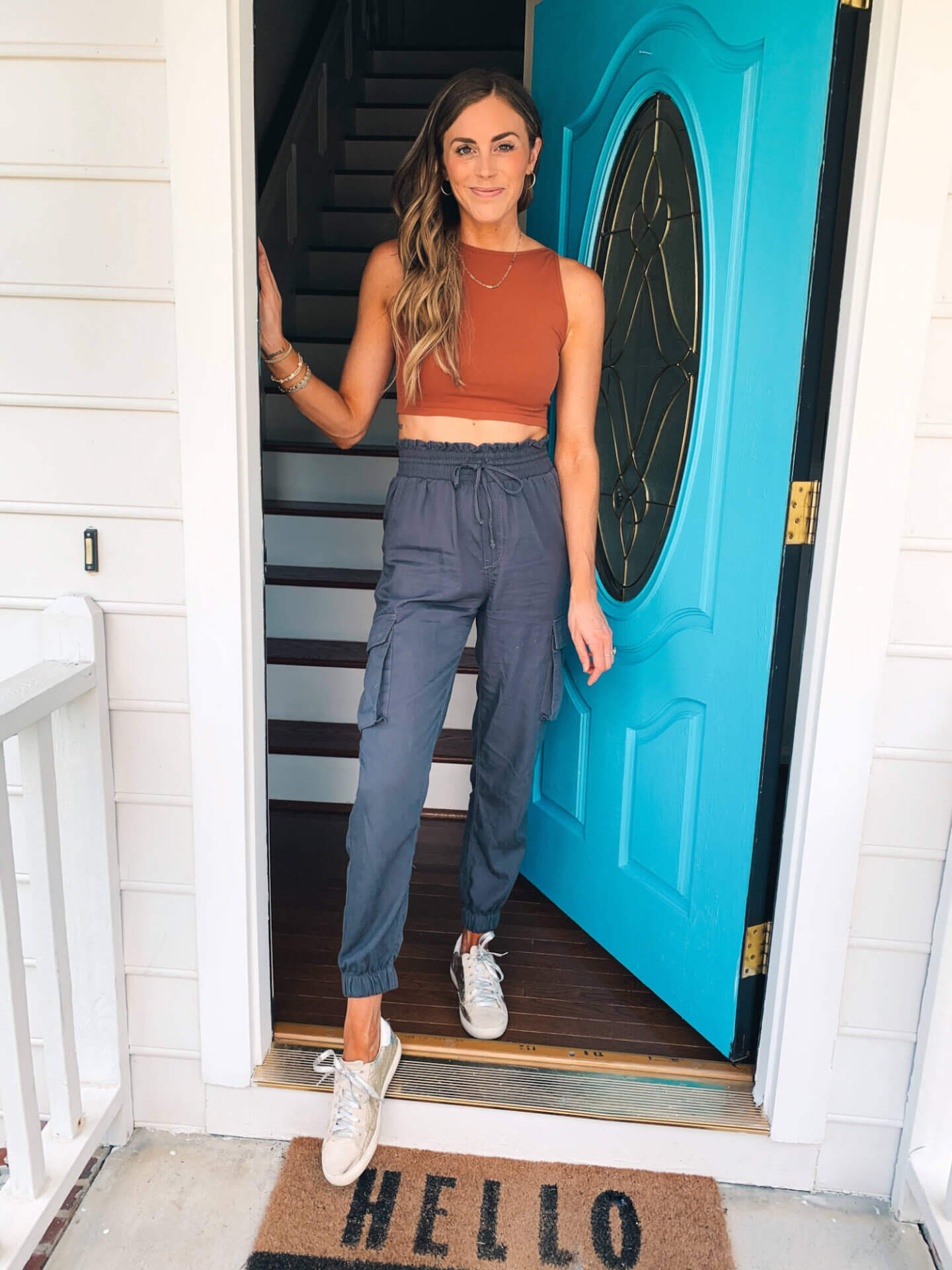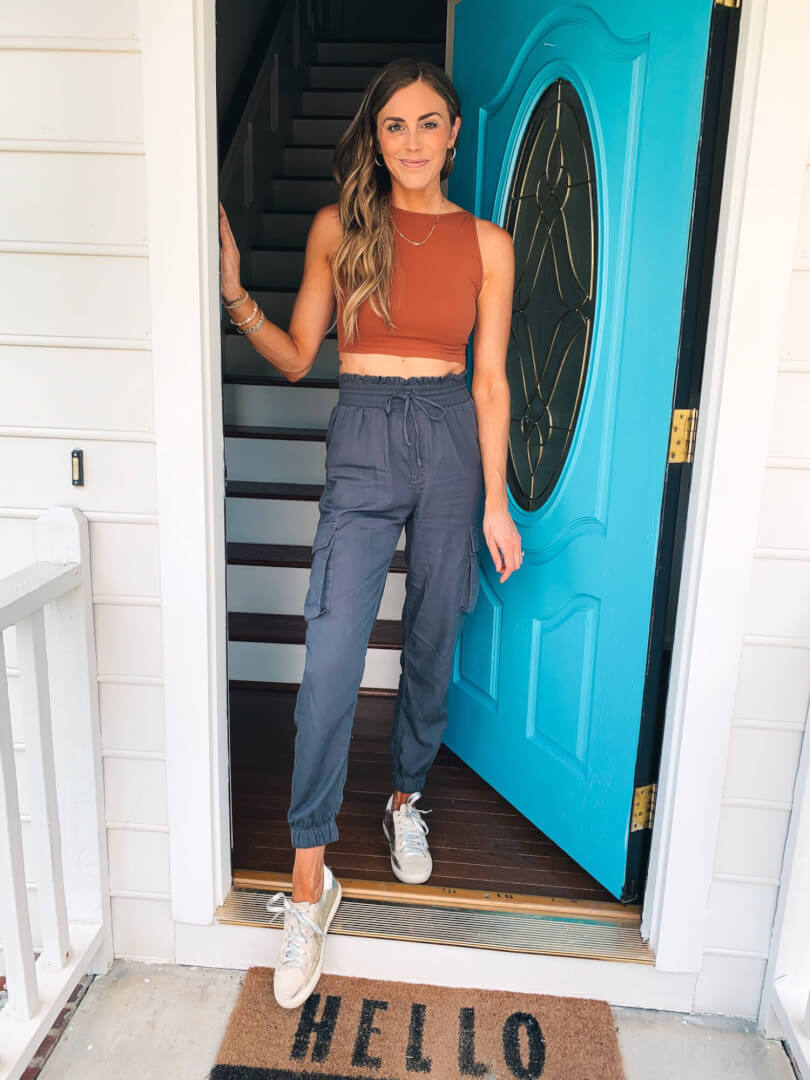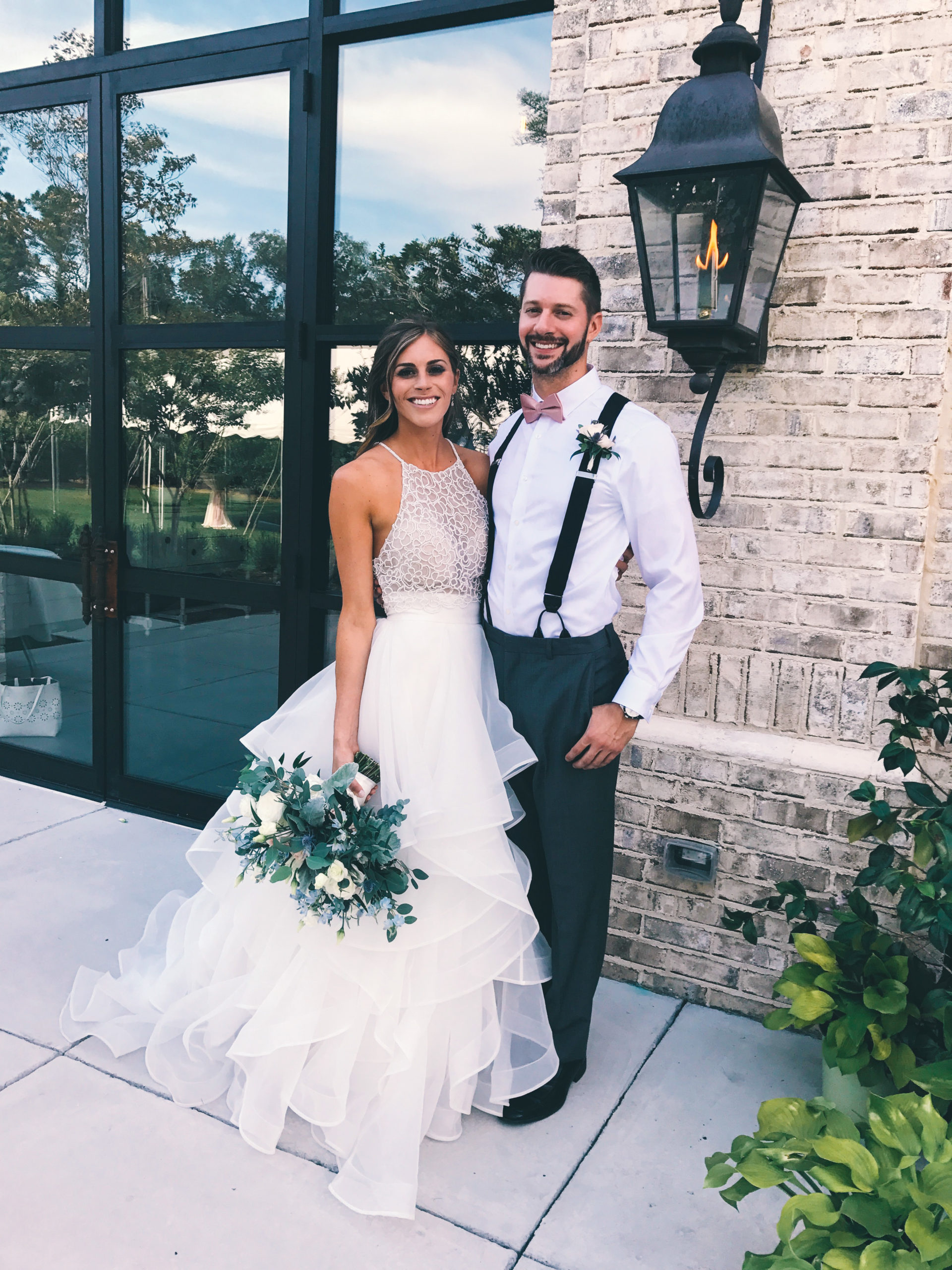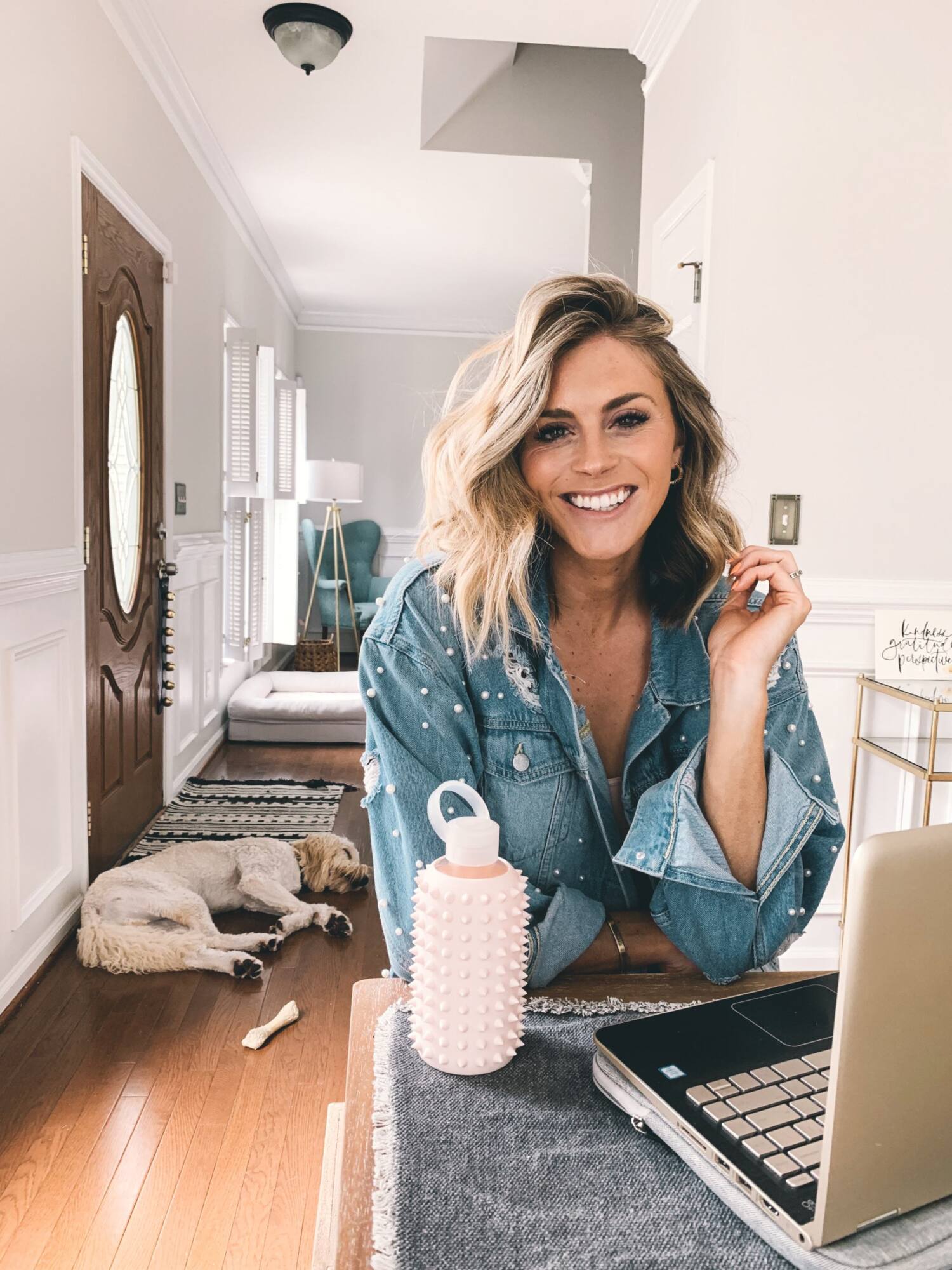
Okay, so I debated writing this post because 1. this information can be kind of boring and 2. I don’t love getting into a bunch of financial stuff BUT a lot of you have requested it, and these are things I wish I knew before buying our first home and what we learned about buying this time around. Disclaimer: I clearly do not know all the ins and outs of the process but just sharing what we’ve learned along the way and our experience.
So lots of questions about lenders, down payments, having 2 mortgages, etc. I’m going to do a Q&A style based off your questions 🙂
Do you really need a 20% down payment? Depends but usually it’s not necessary.
So from what I’ve learned there are 2 types of loans/mortgages. A conventional loan and a jumbo loan. A conventional loan in most areas can go as high as $510,400 (as of June 2020, last year it was in the $400K range). If you go with a conventional loan (so the bank is lending you $510,400 or less), you are actually only required to put down 3%. TBH, this is about what we did when we bought our current house. We only had my nursing salary for our total income and weren’t able to put down much more than that. In general, if you put down less than 20% you will have to pay what’s called PMI. PMI stands for Private Mortgage Insurance and is an additional fee added into your monthly mortgage; it is usually .5-1% of your total loan split into monthly payments. So for easy math if your house was $100K, PMI could be $1000 a year =an additional $83 per month. Once you pay off 20% of your home, either up front with your downpayment, or after years of paying off your mortgage, that PMI fee goes away. **Note: Some expensive markets have a higher cap on the conventional loan amount from what I understand so if you live in an area where real estate is more expensive check with your mortgage lender what the conventional loan cap is in your area.
Then there is what are called jumbo loans. Jumbo loans are what you want/need if you want to take out a loan larger than the $510,400. They typically require a larger downpayment than a conventional loan, but like a conventional loan you still prequalify based off your yearly income and debt to income ratio, etc. You can obtain a jumbo loan through a bank that your mortgage lender may work with or you can go through a credit union. Because this is a bigger loan, they also usually have a higher interest rate. What we learned though is that because of COVID, many private banks are either not doing jumbo loans right now (too risky due to the fluctuations with the economy) or if they were, they were requiring close to a 20% downpayment. So 20% down on a 600K+ house…you do the math lol.
However, we also found out that credit unions can do a jumbo loan with a smaller downpayment than the 20%, however, you also have to show that you have 6 months worth of your monthly mortgage in your bank account in cash at time of close. If you really want the details, with the credit union there are almost 2 tiers of jumbo loans. The first one caps at around $625/650K. If you want a loan of this size, you have to put down at least 5% and have the 6 months worth of your monthly mortgage payments in your bank account at close. If you want a larger loan than this, so think around 700k+, if your income qualifies then you also have to put down closer to 10% plus have the residual 6 months cash at closing. Again, this is just the general gist. Obviously talk to your mortgage lender about specifics!
What do mortage lenders look at when deciding how much you get approved for? In general these are some of the main things that lenders will look at when you apply for any type of loan: employment, income, debt to income ratio, credit score, etc. From my understanding those are the main things that they will look at. Also keep in mind, just because you are making a certain salary, if you have a high debt to income ratio you may not be approved for as much, vs. if your salary is lower but your debt to income ratio is low, that may give you more “leverage”.
As you can see, there are a lot of different factors that can go into what kind of loan you may way to apply for, so just talk with your mortgage lender about what they may recommend. You can also ask you realtor for any additional advice too!
How much money should you have saved prior to looking for a house? So to answer this question, I would say if you are looking at a conventional loan, I would shoot for at least 5% because you also need money to cover closing costs, etc. It can take a long time to save up for a 10-20% downpayment when you could be building up equity in a house. So I would say you want to at least have 5% available for whatever price range you’re looking at! (At least 3% for the downpayment and then some extra to cover additional closing costs).
Should you have your furniture costs and renovations built into the budget when looking? Depends! So if you are looking for a total fixer upper then I’m assuming you’ve already included all those additional costs 😉 So if you know you aren’t looking at houses that need a total renovation then these are things you may want to think about from a budget standpoint regarding renovations and furniture when looking at houses:
What needs to be done right away and what will that cost? So this isn’t what you want to have done right away but what NEEDS to be done ASAP? For example, when we first moved in to our first house, the entire house was bright blue. It was BAD. So obviously that was something that needed to be totally re-done right away. I could not live with that paint color. The other things that we wanted was to replace all the ceiling fans because they were ancient (but that wasn’t a big cost). Other things we wanted to do but weren’t absolutely necessary: add floating shelves in kitchen, furnish sunroom, re-do masterbath.
For me, I knew we couldn’t do all those things right away and I was okay with that! Remember that you don’t furnish a house overnight, it’s a process that you add to over time (hence why 2 years later we just added a new living room chair). So for me, we had enough money that I knew we could furnish the new place with a new couch, and dining room table and chairs (the main items) and everything else could be added from the next month over the next few years. So those big furniture pieces were included in our budget since we knew those were items we would be using/sitting on daily. But as far as other furniture/updates, we didn’t include that in our budget. We just brought the items from our apartment and made it work until we could afford to buy pieces that fit with the new place. For me, I would rather use the extra money to find a house I love and then take my time re-decorating versus buying a less expensive home that I don’t love as much but can re-decorate quicker. So it is really up to you!
To give you another example though– the new house we’re moving into, nothing has to be re-done but I would like to re-do some items per my personal taste. For example, I really want to re-do the kitchen. But is the kitchen so bad that I have to re-do it as soon as we move in? No. It’s the first on my list, and my plan is to re-do it pretty soon after move in but if it doesn’t work out that way due to budget, we can hold off. It’s not the end of the world lol. The house overall was worth it to me that I am okay with post-poning projects if we need to. If you’re touring a house though and you’re like god, this kitchen is so terrible (like the blue walls) and it needs to be re-done ASAP but you knew you couldn’t afford to for a year or two, then yeah I’d probably look for another house that is a better fit!
I think it comes down to 1. acknowledging that you aren’t going to buy furniture for your entire new house overnight or re-model everything overnight either. And 2. If you’re looking at a house and it’s at the top of your budget but you know there are things that you absolutely hate and need to re-do ASAP but wouldn’t be able to cover the costs, then it may not be the best house! You may be able to find something closer to your budget without as many re-model projects or something that is lower in cost so you have more wiggle room to re-design.
How does your old mortgage “end”? So once you sell your old house you take that money from the sale and pay off your old mortgage in it’s entirety. Whatever is left is what you get to keep/what is considered your equity. Then a brand new mortgage will start on your home for whoever purchased it.
How do you handle 2 mortgages, will they overlap? Ideally they won’t because you will sell your house before the mortgage on your new house kicks in. So for example, we close on the new house July 13th and we have to be out of our current home by July 20th, but our first mortgage payment for the new house doesn’t start until September. The next questions answers more on this!
How do you know what amount you can offer the seller if you haven’t sold you current house yet? So I think this question was coming from a place of wanting to use your equity from your old house to buy the new one. Which makes perfect sense. The reason so many people don’t move just after a year or two is because they want to build up equity in their current home that can be transferred into buying their next house. But there are a lot of ways to answer this so I asked our realtor Chip Barker from Core Realty to answer this one! :
Keep in mind, this varies depending on where you are in the country and what the Purchase Contract looks like in those states. The actual process of putting in an offer differs from state to state as well.
The first step is to ask your realtor for a lender recommendation. Then contact the lender to find out whether you need to sell your home to buy a new one and what the #’s look like in both scenarios.
1. If you have to sell your current house to buy a new home then there are 2 things that happen sort of simultaneously.
Your lender will determine what you can afford if you sell your house. They will take into account what the expected proceeds are from the sale of your house, based on what you tell them after your conversation with your realtor, as that will impact what you have to put down as a down payment and to use towards closing costs.
The other conversation is with your realtor who will pull together a “Seller Estimated Net Sheet” for you. That estimate will be based on the anticipated sale price of your home in the current market, less your mortgage balance and the expected costs to sell the house which include things like: the realtors commission, the fee paid by the seller to the attorney/title company for their part of the paperwork, the recording fee to record the sale, transfer tax on the sale, potentially a fee to the HOA Mgmt Company to transfer that to the new owners, prorated taxes and HOA fees – which vary based on when in those billing cycles you sell your house.
From here it can go one of 2 ways
A. You can put your house on the market first and begin your search for a new one (this is risky in the Raleigh area since we’re in such a strong seller’s market, you may sell your house but not be able to find one to buy and then you could be homeless – but see option 3).
B. Or you can begin your search for a new home once your house is prepped to go on the market at a moment’s notice. When you find a home you’re interested in you will work with your agent to review the comparable properties to determine a good offer price, pull together an offer with terms that are comfortable to you, and in NC you’ll indicate that you have to sell your house to buy. This is called a “contingent offer” because your ability to purchase the new house is contingent on selling your current one. This is different than a house being “contingent” in MLS or your favorite real estate website – that just means it’s under contract.
Contingent offers are often not viewed as favorably because the seller may be concerned your house won’t sell. This may impact your ability to negotiate so you may have to go with a higher offer price or higher Due Diligence Fee (the money you pay the seller in NC to basically take their house off the market while you’re doing all of your due diligence investigations – inspections, appraisal, insurance quote, etc). Your agent will be working on your behalf by sharing with the seller’s agent a package indicating what the comps say your house should sell for, some info about the condition, and the anticipated list price to ease their mind about the likelihood of it selling quickly.
As soon as your offer is accepted you’ll generally allow showings to start on your current house and hope that you can negotiate an offer on the sale of your home that works with the closing date on your new home. Typically you’d close in the morning on your old house and the afternoon on your new house to give the funds you need for your purchase time to get to the closing attorney for your new house.
There is a lot of negotiation (and nuances) both on the purchase of your new home and the sale of your existing home and coordination by your realtor to make this a seamless process, but people do it all the time.
2. If you don’t have to sell to buy (so you don’t need the equity in your current home to purchase your next house) then you’d simply search for a new house in the range your lender has said you can afford, based on your assets, debt payments, etc.
Then at your convenience, after you’re under contract on your new house, you would put your current house on the market – based on whether you wanted to sell quickly while you’re still living there or move out first and then market it.
3. There is a 3rd way you can sell your house and buy a new house and that’s using a “Seller Possession after Closing” which basically allows you to sell your current home and continue to live in it, paying “rent” to the new owners, until you close on your new house, up to about 30 days. This is VERY rare and a lot of agents and buyers don’t like them for a lot of different reasons.
Okay, Claire here! I hope this post was helpful and let me know if you have any other questions and I’ll do my best to help!









This is so helpful, thank you! My husband and I are trying to figure out timelines of when to sell our current house, when to buy the new house, etc. You said you close in July but you need to move out of your current home in June—where will you guys be living for those couple of weeks? I foresee this happening to us too lol
Oh sorry I mistyped that. I meant to say JULY 20th. So we move into the new house a week before we close on the old one. If you buy a new house before you sell (which is what most people do) then your closing date on your current home should be after the new one so you aren’t homeless for a week haha
Thanks so much! Currently going start looking at homes later this year and trying to learn as much as possible!
no problem! and yay, that is so exciting!! 🙂
Claire,
This is such valuable information. Thank you so much for sharing this information. Terrance and I are interested in purchasing a rental property sometime in the near futute.